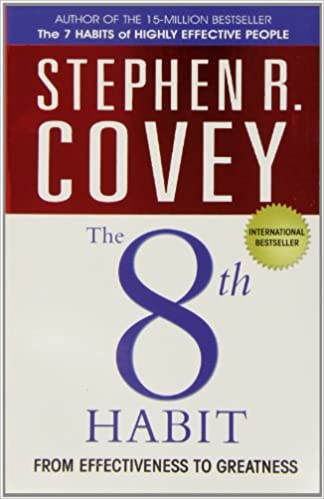The 8th Habit – Stephen R. Covey

“The 8th Habit” is a self-help book that focuses on finding one’s voice and inspiring others to do the same. Covey argues that the eighth habit is the ability to find one’s voice and inspire others to find theirs. He asserts that by doing so, individuals can achieve their full potential and make a positive impact on the world.
The 8th Habit: Find Your Voice and Inspire Others to Find Theirs
The central idea of the book is that finding one’s voice and inspiring others to find theirs is the 8th habit, the key to personal and organizational greatness.
The Six Paradigms of Human Interaction
Covey describes six paradigms of human interaction: win-lose, lose-win, lose-lose, win, win-win, and win-win or no deal. He argues that the win-win paradigm is the most effective for achieving long-term success.
The Four Quadrants of Time Management
Covey introduces a time management system based on four quadrants: important and urgent, important but not urgent, not important but urgent, and not important and not urgent. He argues that focusing on important but not urgent tasks is key to achieving long-term goals.
The Three Resolutions
Covey introduces three resolutions that individuals can make to achieve the 8th habit: to find one’s voice and help others find theirs; to focus on the important but not urgent, and to develop all four intelligences.
The 7 Habits of Highly Effective People
Covey’s earlier book, “The 7 Habits of Highly Effective People,” provides a foundation for the 8th habit. The 7 habits are: be proactive, begin with the end in mind, put first things first, think win-win, seek first to understand then to be understood, synergize, and sharpen the saw.
The Four Disciplines of Execution
Covey introduces the four disciplines of execution: focus on the wildly important, act on lead measures, keep a compelling scoreboard, and create a cadence of accountability. These disciplines are designed to help individuals and organizations achieve their most important goals.
The Four Cores of Credibility
Covey identifies four cores of credibility: integrity, intent, capabilities, and results. He argues that individuals and organizations must develop all four cores to be truly credible.
The Four Intelligences
Covey identifies four bits of intelligence that are necessary to achieve the 8th habit: physical, mental, emotional, and spiritual. He argues that individuals must develop all four bits of intelligence to reach their full potential.
The Five Waves of Human Civilization
Covey describes five waves of human civilization: the hunter-gatherer era, the agricultural era, the industrial era, the information age, and the age of wisdom. He argues that we are currently in the age of wisdom, where the focus is on finding meaning and purpose.

